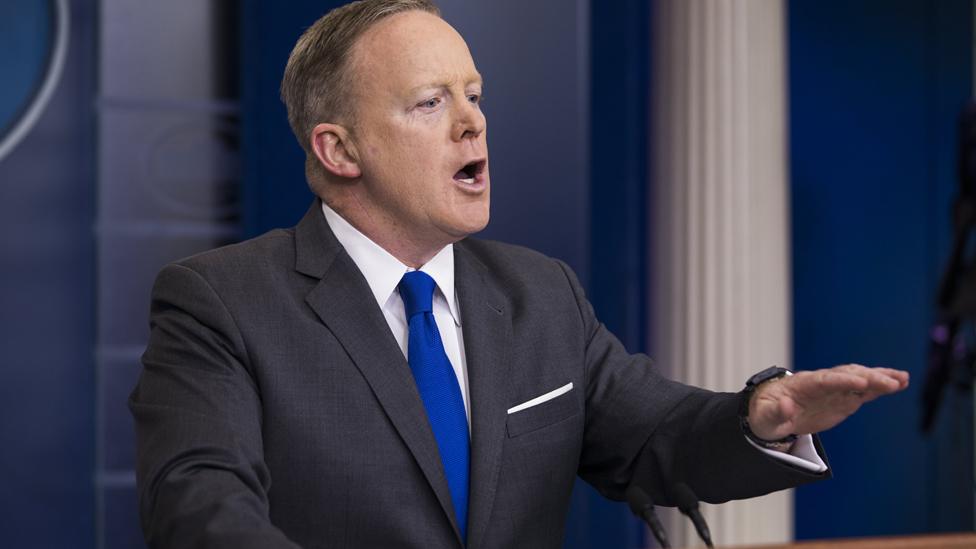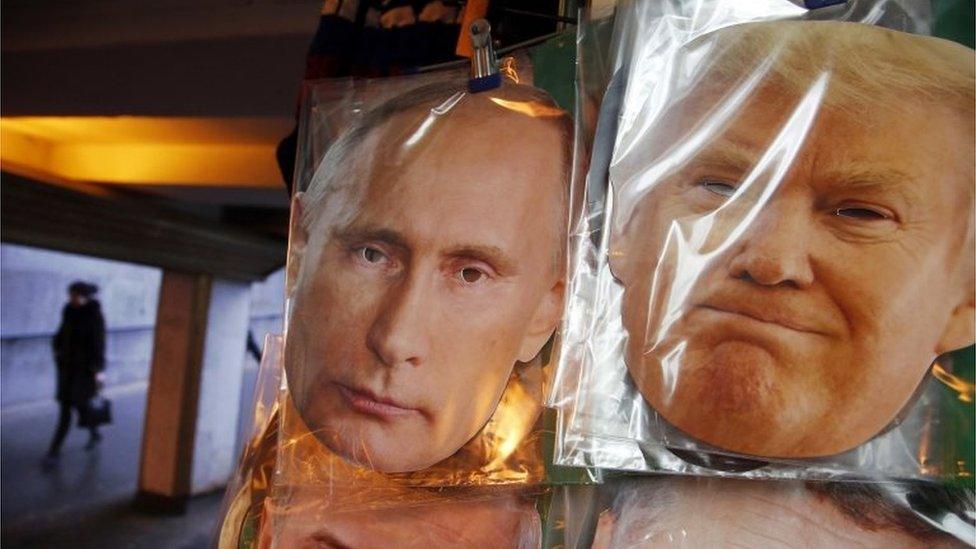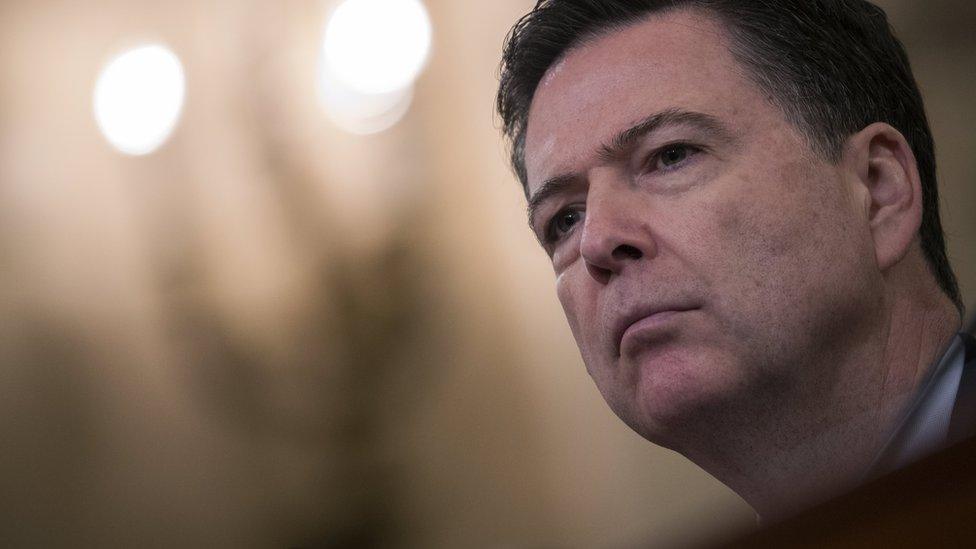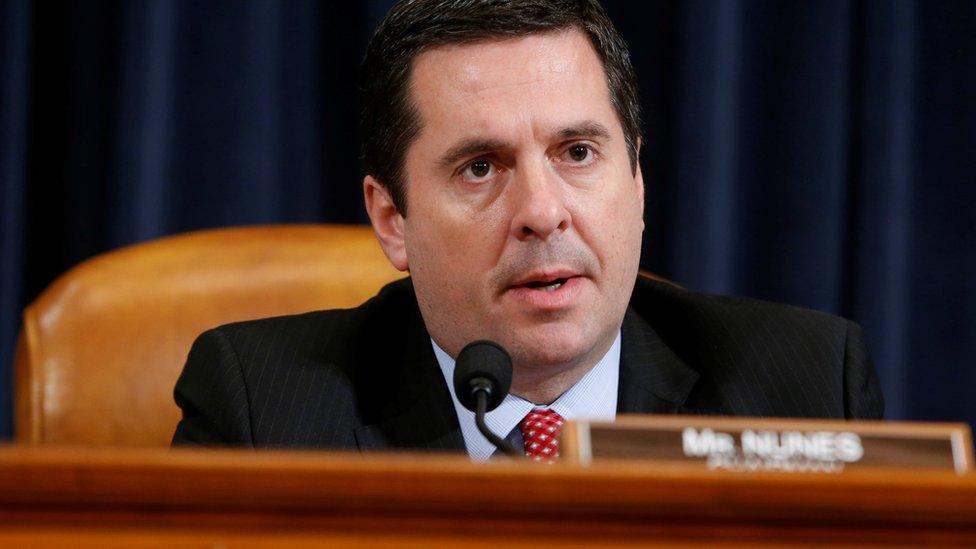Could FBI investigation into Russia links ensnare Trump?
- Published
What FBI Director Comey said on Trump, Russia and wiretaps
House of Comey, that hit political intrigue show from last year, is back on the airwaves, and this season looks like it's going to be another edge-of-the-seat affair.
Some of the characters have changed, of course. Femme fatale Hillary Clinton and her team of Democratic Party heavies have been replaced by tough-guy Donald Trump and the alt-right gang. Fans will be thrilled to learn, however, that top law-man James Comey is back for another turn in the spotlight.
In this year's first episode, the FBI director faces down congressional inquisitors, who press him for information on allegations that Russia - those long-time stock Hollywood villains - tried to meddle in the 2016 US presidential election.
Here's a quick review of what we learned and what we still don't know. No spoiler alerts are necessary - the big revelations will have to wait until the season finale ... if there ever is one.

What we now know
There is an active, ongoing investigation
After a bit of grandstanding on the part of the top members of the House Intelligence Committee and a warm-up act from National Security Agency head Mike Rogers, Mr Comey led with the big news of the day.
"I have been authorised by the Department of Justice to confirm that the FBI, as part of our counterintelligence mission, is investigating the Russian government's efforts to interfere in the 2016 presidential election, and that includes investigating the nature of any links between individuals associated with the Trump campaign, and the Russian government, and whether there was any coordination between the campaign and Russia's efforts," he said.
'Putin hates Clinton' and other things the FBI learned about Russia
That there is an investigation isn't exactly breaking news - the BBC's Paul Wood reported on it in early January - but official acknowledgement is a significant development.
The fact that his investigation first began in July, during the heat of the 2016 election campaign, will likely leave Democrats howling. They will contrast Mr Comey's wide-ranging comments on the investigation into Hillary Clinton's email server with his until-recent silence surrounding the Trump-related inquiry.
Mr Rogers also said that the intelligence community stands behind the declassified report, external it issued in early January that concluded that the Russia government attempted to influence the US election in a way that helped Mr Trump's candidacy.

There is 'no evidence' Barack Obama wiretapped Trump Tower
Trump's wiretap saga explained in two minutes
The other big revelation of the day was how thoroughly both Mr Comey and Mr Rogers debunked the president-tweeted allegation that Barack Obama or his Justice Department had authorised the wiretapping of Trump Tower.
"With respect to the president's tweets about alleged wiretapping directed at him by the prior administration," Mr Comey said, "I have no information that supports those tweets. And we have looked carefully inside the FBI."
Indeed, the ability to order such surveillance was outside the powers of any president, Mr Comey said.
Mr Rogers also dismissed allegations that Mr Obama had bypassed domestic surveillance controls by requesting that British intelligence oversee the operation, noting that the accusation "frustrates a key ally of ours".

Donald Trump isn't backing down
Anyone expecting a chastened president to step forward after the day's proceedings obviously isn't a real fan of this particular show. Before the congressional hearings had even concluded, Mr Trump - or, perhaps, his staff, given that the tweets were unsigned - was firing off from the official @potus presidential account.
He tweeted that the NSA and FBI had confirmed that Russia "did not influence electoral process" (although they only had spoken about tampering with vote counts), that "unmasking individuals" in leaks - read, deposed National Security Advisor Michael Flynn - endangered national security and that leakers had been "unusually active" recently.
He also asserted that Mr Comey admitted that the Obama White House "had the ability" to do such unmasking and that the FBI director wouldn't deny that Mr Obama was told about the secret recording of Flynn's conversation with a Russian ambassador.
It doesn't take a super sleuth to deduce that the point of these tweets was to imply that it was the Obama administration, or perhaps even the ex-president himself, behind the leaks that have fuelled speculation about Trump-Russia election collusion.
Press secretary Sean Spicer was as combative as ever, saying that the president had no plans to apologise for accusing his predecessor of wiretapping Trump Tower.


What we still don't know
When will this investigation end?
Although the FBI case has been open since July, Mr Comey said the effort is still in its early stages.
"For counterintelligence investigations, that's a fairly short period of time," he said.
That has to be more than a bit disconcerting to the Trump White House, which has been knocked off course by this Russia story since practically the moment Mr Trump took the oath of office. And while the administration seems intent on cracking down on unauthorised leaks out of this investigation, their efforts are unlikely to succeed.
A few weeks ago, the New York Times reported, external that Obama administration officials, prior to leaving office, had tried to disseminate intelligence related to Russian influence on the 2016 election as widely as possible in hopes of allowing it to eventually enter the public domain.

Face masks depicting Vladimir Putin and Donald Trump hang for sale at a souvenir street shop in St Petersburg, Russia
A one-two punch of those revelations and any new developments in the FBI investigation is likely to keep the Trump team off balance for quite some time.
"This work is very complex and there is no way for me to give you a timetable as to when it will be done," Mr Comey said in his opening remarks. "We approach this work in an open-minded, independent way and our expert investigators will conclude that work as quickly as they can but they will always do it well no matter how long that takes."
If Mrs Clinton were to come back for a cameo this year, she'd likely tell the audience that the only thing worse than an FBI investigation is an open-ended FBI investigation.

Who is targeted by this inquiry?
Time and again when asked about specific allegations or evidence relating to Russian contacts by specific members of the Trump campaign team, Mr Comey was silent.
Former Trump campaign manager Paul Manafort, who had ties to pro-Russian Ukrainian politicians? No comment.
Long-time Trump advisor Roger Stone, who reportedly had communications with individuals who hacked the Democratic National Committee emails? No comment.
Former National Security Advisor Flynn? No comment.
"I really don't want to get into answering questions about any individual US person," Mr Comey said.

On Saturday, Lawfare blog editor Benjamin Wittes wrote, external that the worst-case scenario for the Trump White House was if Mr Comey appeared before the congressional committee and was tight-lipped.
A loquacious Comey, he said, was evidence of an investigation that was near its end with little evidence of substantive wrongdoing in the higher levels of the Trump brain trust.
But what would happen, Wittes wondered, if Mr Comey's FBI investigation is turning up real evidence?
"In this situation, I would expect him to be minimally verbal. He may have to answer yes or no questions in certain instances, including about the truth of the wiretapping allegations, but he will refuse to answer a lot of questions. He will make as little news as humanly possible. He will be exceptionally spare with his opinions."
"I'm trying to be studiously vague to protect the integrity of the investigation," Mr Comey said at one point on Monday.
Wittes has since, external parsed the director's words and concluded that it was a bad day for Mr Trump. "Really bad."
Mr Comey's relative silence could be deadly.

What will Republicans do?
Going into Monday's congressional hearing there was more than a bit of unease among Republican politicians over the allegations of ties between the Trump team and Russian interests.
Republican Senator Lindsey Graham of South Carolina said his committee was going to "find out all things Russia".
"We're trying to build a case," he said. "So, this is what Russia's doing in other places. Then we're going to dig into what they did here."
During the House intelligence committee proceedings, however, Republican lawmakers hewed closely to the White House line that the real story is the illegality of the intelligence community leaks about Trump team contacts with Russian officials.

Committee chairman Devin Nunes urged a speedy conclusion to the investigation, saying it had left a 'grey cloud' over the administration
From committee Chair Devin Nunes on down, they focused laser-like on impressing on Mr Comey the damaging nature of the leaks and the need to determine who is responsible for them.
If this is the view of rank-and-file Republicans coming out of the Comey hearings, then the Trump administration likely will feel well equipped to weather any resulting storm.
Although the president has been sagging in recent polls, Republican support for Mr Trump continues to be strong. Given that conservatives hold the levers of power in Washington DC, a united party will be able to fend off Democratic allegations as long as the FBI investigation fails to turn up any solid evidence of malfeasance.
In other words, all eyes are on Mr Comey and the FBI once again.
Last year, his letter to Congress just two weeks before election day proved to be a seismic plot twist. Can the Trump-Russia investigation top that?
Keep tuning in to find out.